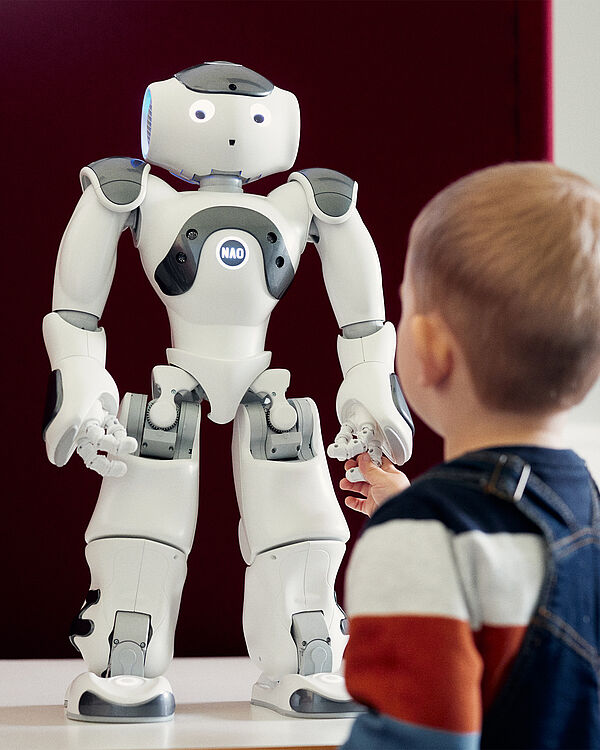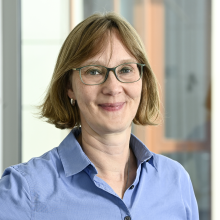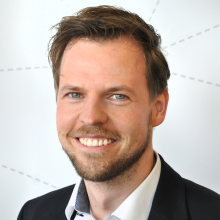Artificial Intelligence: Research to Benefit Society
Pioneering Work for our Future
Artificial intelligence (AI) can already be found in various areas of our digital and networked lives. It enables groundbreaking progress for society, whether with medical diagnoses, as an everyday language assistant, or in developing new transport concepts. AI systems can automate processes and handle hugely complex data volumes, making solutions increasingly efficient and ensuring more innovative areas of application. The key social challenges of our time such as climate change can benefit from this – for example, via optimised resource management or intelligent energy distribution. Researchers at Paderborn University are contributing to this revolutionary technology with fundamental research into knowledge graphs, training algorithms and the semantics of AI, as well as into social acceptance, ethics and the design of human-AI interactions.
The Downside of AI Use
However, using AI also involves risks. Concerns regarding data protection, the dangers of disseminating false information, worries about ensuring human self-determination – there are various reasons for being sceptical about AI systems. In addition, its technical operation is very difficult for many people to understand. One central goal of the research being conducted in Paderborn is therefore to make the associated systems more transparent, comprehensible and thus secure. To achieve this, our researchers are involved in numerous international and interdisciplinary research projects examining the explainability of this technology and responsible use of AI in all areas of society.
AI Research in Paderborn
Paderborn University is a key location for the further development of AI research. Our researchers work in interdisciplinary teams to examine not just the technology itself, but also and in particular the cultural studies implications of AI. Researchers from linguistics, psychology, media studies, sociology, economics and computer science are working in the transregional Collaborative Research Centre (CRC/TRR) ‘Constructing Explainability’ with experts from Bielefeld University on areas such as the principles, mechanisms and social practices of explanation and how these can be taken into account in developing AI systems.
Furthermore, under the ‘Intelligent technical systems’ key research area, Paderborn University has pooled its research on the interplay between algorithms, information technology, mechanics, sensor technology and actuator technology. To research system behaviour, researchers have been examining the complex interplay between components, interactions with users, and the specific features of their application. International collaborations, such as the Europe-wide doctoral candidate network ‘Marie Sk?odowska-Curie Innovative Training Network (MSCA-ITN)’, which is coordinated in Paderborn, also play a vital role for the profile discipline. The researcher infrastructure of the Paderborn Heinz Nixdorf Institute (HNI) offers the ideal setting for cooperation between engineering, science and computer science.
The SICP – Software Innovation Campus Paderborn is also benefiting from strong AI research in the region. This is where research meets business: around 30 interdisciplinary working groups are working with companies to develop marketable concepts, methods, technologies and tools for areas such as large-scale distributed and intelligent systems, secure wireless communications, the agile and human-focused development of socio-technical systems, digital business models, and intelligent customer management.
Intelligent Socio-Technical Systems

Where humans and technology meet: as well as being simply fed with data or trained using algorithms, intelligent socio-technical systems also learn new skills via interactions with humans. Human requirements for these developments are therefore the constant focus. One example application is the use of care robots. The facets and the complexity of intelligent socio-technical systems require expertise in a variety of areas, achieved via research collaborations.
Building on the fundamental research conducted by the Joint Artificial Intelligence Institute (JAII), the universities of Paderborn, Bielefeld and Bremen have formed the ‘Joint Research Center on Cooperative and Cognition-enabled AI’ (CoAI JRC) in order to teach robots how to think and communicate in way that enables them to work towards the same goals as human partners and (depending on their skills) achieve them with their joint efforts. Paderborn’s expertise is in implementing properties that enable an AI system to negotiate objectives with its partners and work together to achieve them. This also requires research into human skills, so that people can receive the requisite training.
New Training Methods
To further improve people’s understanding of AI and their skills in working with this technology for the future, it is vital that we examine the education system. As an established site for teacher training, Paderborn University offers various ways of making progress in this area. For example, our educational scientists are also involved in various AI projects, such as regarding integrating data science into school lessons, boosting teachers’ digital skills, or even providing digital learning environments at home. Together with the Federal Ministry of Education and Research (BMBF), Paderborn’s computer science education department has for example published the popular board game ‘Mensch, Maschine!’ (‘Human, machine!’).
AI Systems for Successful Transfer
In order to successfully achieve innovation, we are promoting an intensive exchange of ideas between universities, business, politics, society and culture. Paderborn University has therefore also transferred research into practice in the field of AI. Within the ‘it’s OWL’ technology network, our researchers are joining forces with 200 companies, organisations and other research institutions to develop solutions for digital transformation in medium-sized companies: from intelligent assistance systems in everyday work, to virtual workplaces, to data-driven solutions for industrial production. Our experts contribute their knowledge to countless other research colleges, centres of excellence, and joint projects. Whether a business-to-business application, augmented reality environment or production robot, humans also remain the focus: the aim is to achieve human-centric workplace design.
Another influential transfer project is RailCampus OWL: the higher education network Campus OWL, the railways, business and municipalities in Minden are developing a unique innovation network for future railway technology and training students for the transport revolution on the railways with the ‘Digital Railway Systems’ course.
AI Experts of the Future

Long-term research in this area is more important than ever in order to fully understand rapid technical developments in AI, further develop technology in a targeted fashion, and put it to practical use. Paderborn University is therefore helping young people who want to get involved. Our promotion of young talent starts right from their studies: dealings with AI are an integral part of many study programmes. Students without any prior knowledge are given the tools to access the subject thanks to presentations, workshops and other teaching formats. These are supported by university teaching and learning materials on data-based methods and machine learning processes. Additional programmes alongside studies also offer all Paderborn students an opportunity to take an in-depth look at the topics of digitalisation and society, as well as establish direct contacts with business. With research groups, research training groups and sub-projects specifically aimed at doctoral students, postdoctoral candidates and junior professors, we are also honing talent for fundamental and application-oriented AI research.
Further information













